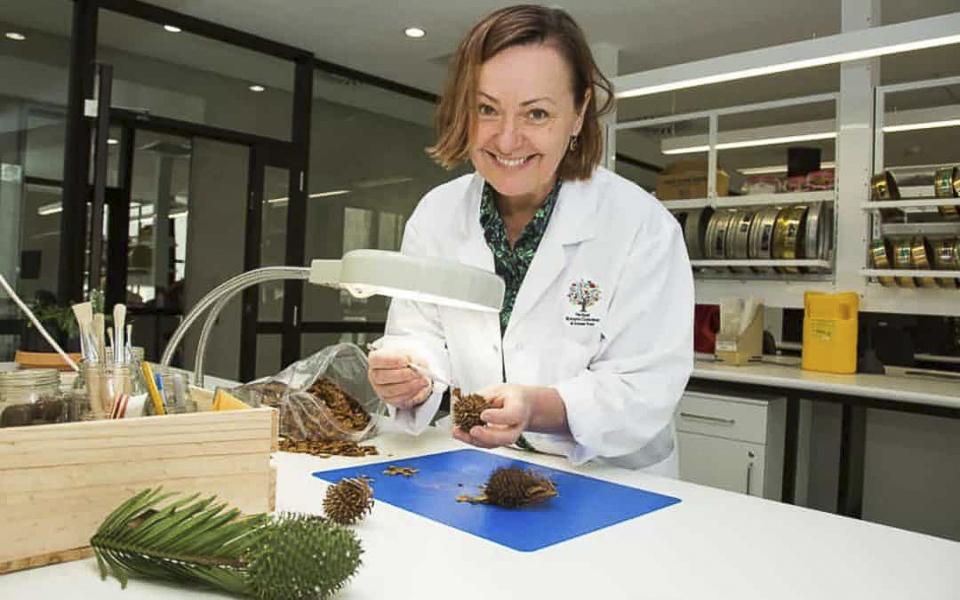
Dr Cathy Offord
Senior principal research scientist, Royal Botanic Garden Sydney (RBGS)
See Dr Offord’s full research profile here.
Research outputs linked to policy change and decision-making
- Conservation biology of threatened species. Dr Offord’s work directly contributes to species management under the NSW Biodiversity Conservation program and the Saving our Species program, particularly in the area of seed biology and ex-situ germplasm conservation. She also conduct research that is targeted to particular outcomes, such as the potential for translocation of endangered species e.g. Persoonia for Department of Planning, Industry and Environment (DPIE) as well as the mining and restoration sectors. This is an emerging area of conservation science, particularly in response to threats such as climate change. It involves many aspects of work of the RBGS, from collecting seeds, to propagation (based on understanding genetics [Peakall et al. 2003, Rossetto et al. 2011, Greenfield et al. 2016] and seed biology etc [Emery and Offord 2018, 2019 a b, Offord]) to understanding the needs of plants once returned to the wild (edaphic, climatic, biotic [Commander et al. 2018, Lewis et al. 2015, Rigg et al. 2016 a and b, 2017]). The Royal Botanic Gardens team have several projects exploring successful translocation to the wild. Dr Offord is a member of the team that oversees the management of the Wollemi pine, and one of our main objectives was to relieve pressure on this species in the wild by providing a mechanism for the public to grow this species. In this regard, with the species now available as a horticultural product in many countries, they consider this objective to have been met with great success. The work that Dr Offord has done on this species is frequently cited as the international exemplar of how research can contribute to the management and conservation of very rare species. She has worked with DPIE on a number of experimental translocations which have yielded much information on successes and failures. The translocations are rigorously designed so that the scientific results are published in peer-review journals and well-communicated to end-users. Dr Offord makes major contribution to national conservation efforts though organising workshops, conferences and developing guidelines, e.g. editor and chapter author of ‘Germplasm conservation in Australia’ (Offord and Meagher 2009 and currently in revision), ‘Translocation guidelines‘ (Commander et al. 2019), co-editor/chapter author ‘Florabank guidelines’, revisions TBA 2020. Through this work, Dr Offord contributes to many other projects with collaborators including the Australian Research Council (ARC) project ‘How do Australian plants cope with extreme temperature?’ (LP180100942).
- Improving the technology of seed banking is a particular focus for Dr Offord as she works actively with the NSW Seedbank, the Australian Seed Bank Partnership, the International Millennium Seed Bank Project and the International Seed Technology Association. Dr Offord’s role is to explore ways to improve the quality and longevity of Australian species in seed banks so that they can be relied on for use in future species recovery and research. This work contributes to many peer-reviewed publications and guidelines.
- The systematic appraisal of eastern Australian flora for its seed storage capability. This project takes an innovative technological approach to the global problem of how to conserve seeds or other germplasm from recalcitrant species, i.e. those species with seeds that cannot be stored in traditional seedbanks (Offord and Meagher 2009, Ashmore et al. 2011). A particular focus of this work is conservation of species susceptible to myrtle rust, a pernicious disease that is leading to local and potentially total extinction of a number of species. Recalcitrance is predominantly a problem found in rainforest species which lack traits (Saatkamp et al. 2018) enabling them to survive drying out and freezing (Hamilton et al. 2009, Hamilton and Offord 2012). Little is known about rainforest flora and how to conserve them, as revealed by our review of the status of Australian/South Pacific region species (Sommerville et al. 2017). In this review, which compiled data from multiple disparate sources, the project found huge gaps in knowledge and identified efforts required to secure germplasm across the region. This was the most downloaded paper from the Australian Journal of Botany in 2017–2018. Through this work, Dr Offord contributes to the ARC project ‘Advanced cryobanking for recalcitrant-seeded Australian rainforest plants’.
Current academic employment and positions
- senior principal research scientist, Royal Botanic Gardens and Domain Trust
- manager, germplasm conservation research, Royal Botanic Gardens and Domain Trust
- adjunct professor, University of NSW.
Highest qualification
- 2001: PhD, University of Sydney
Major prizes, medals and honours
- 2018: NSW Premier’s Prize for Innovation in Science and Engineering
- 2018: ACARP Excellence in Research Award for restoration in the mining landscape
- 2017:: Botanic Gardens Conservation International global team award for the greatest progress in seedbanking
- 1998 NSW Premier’s Award for Industry and Environment for development of flannel flower as a sustainable crop.
